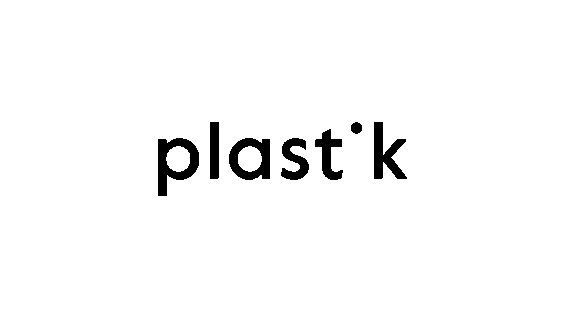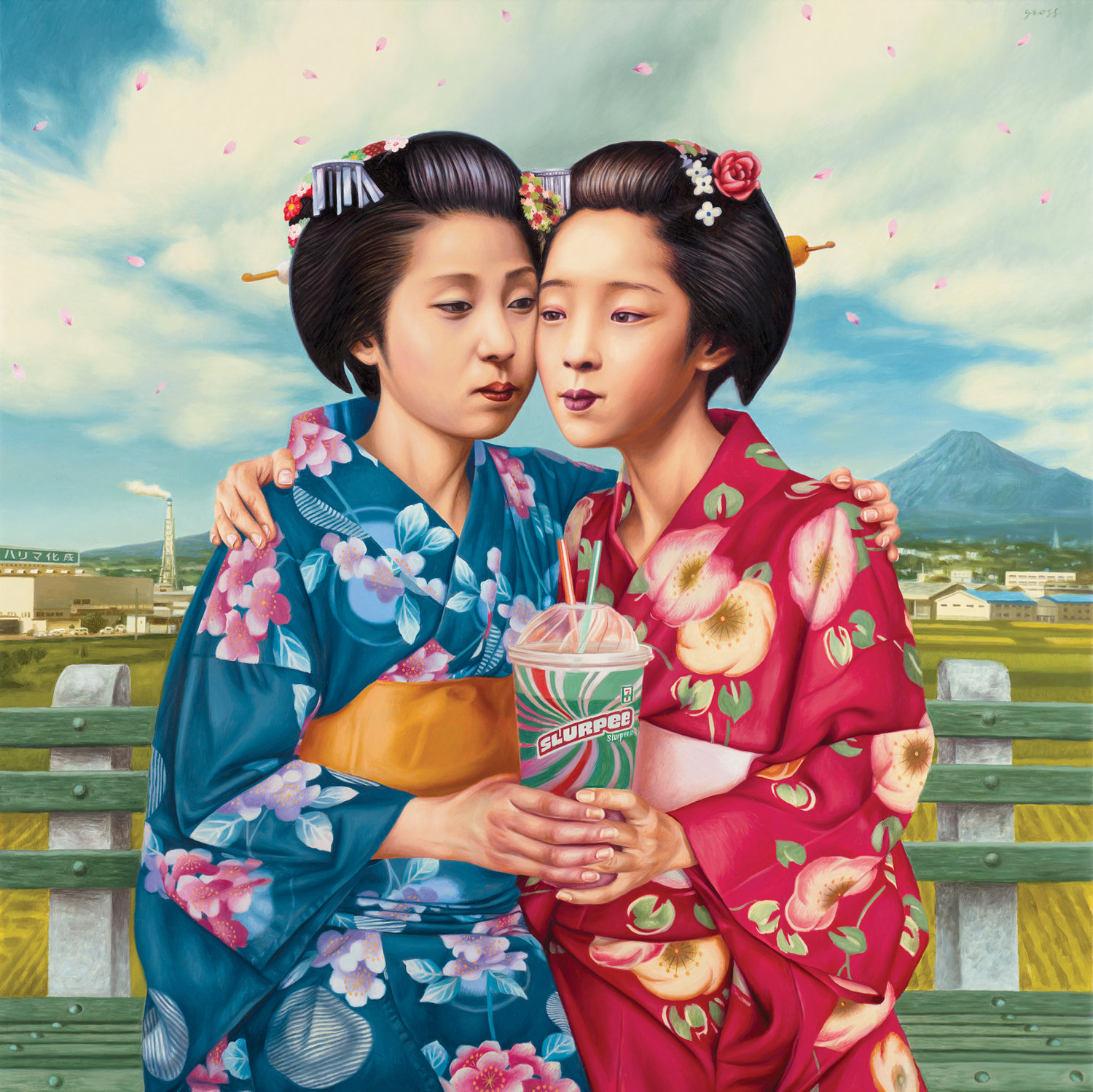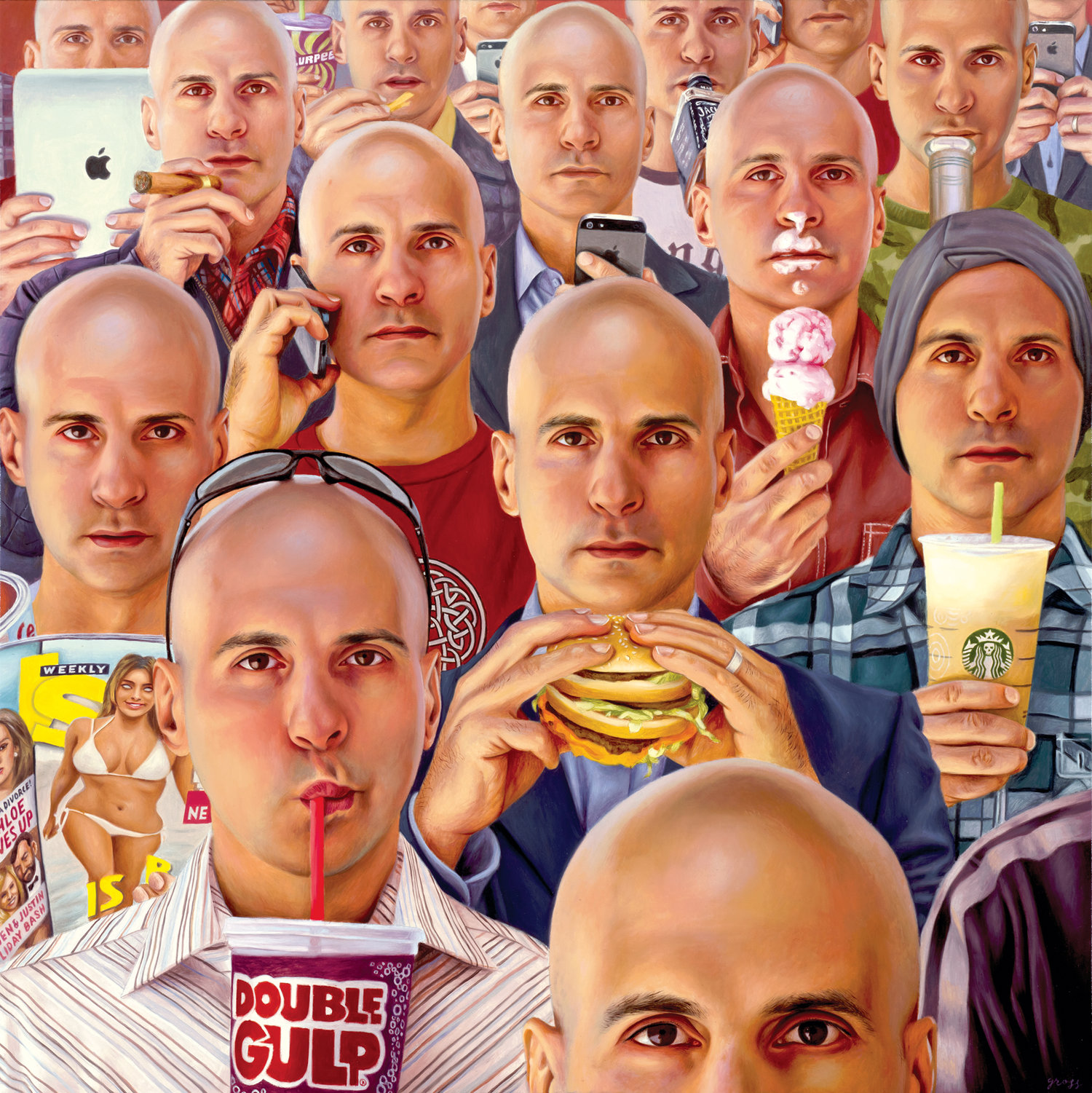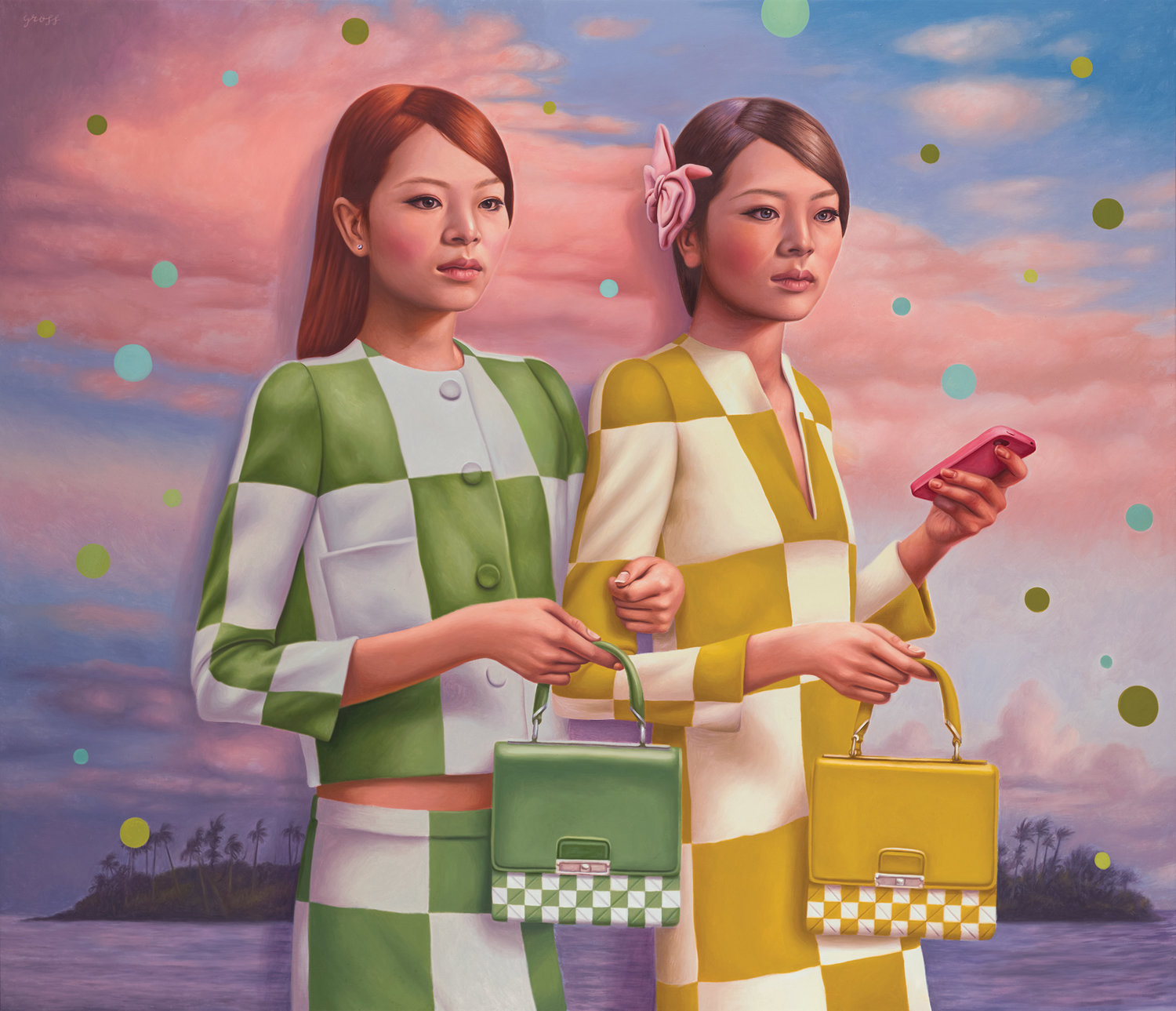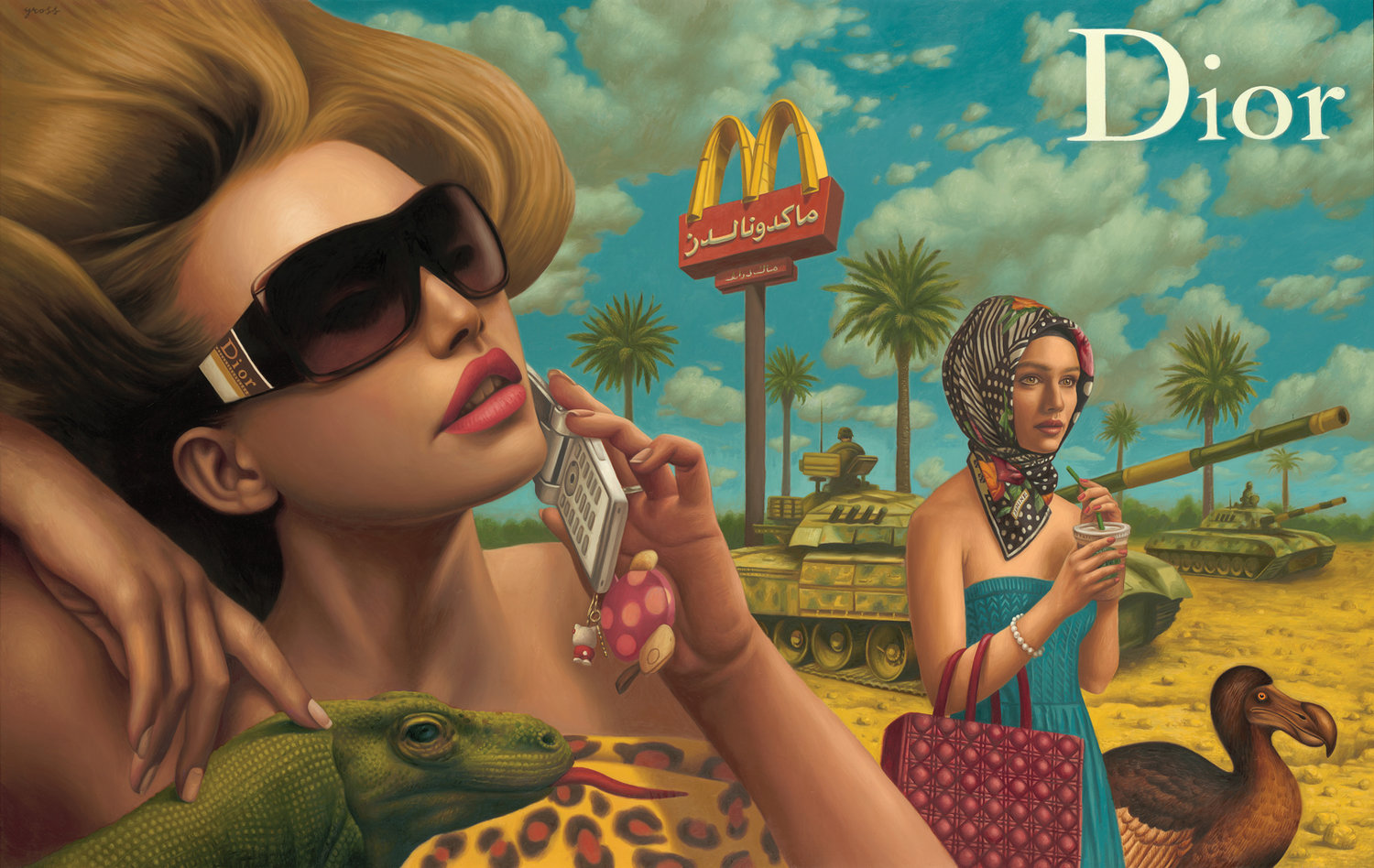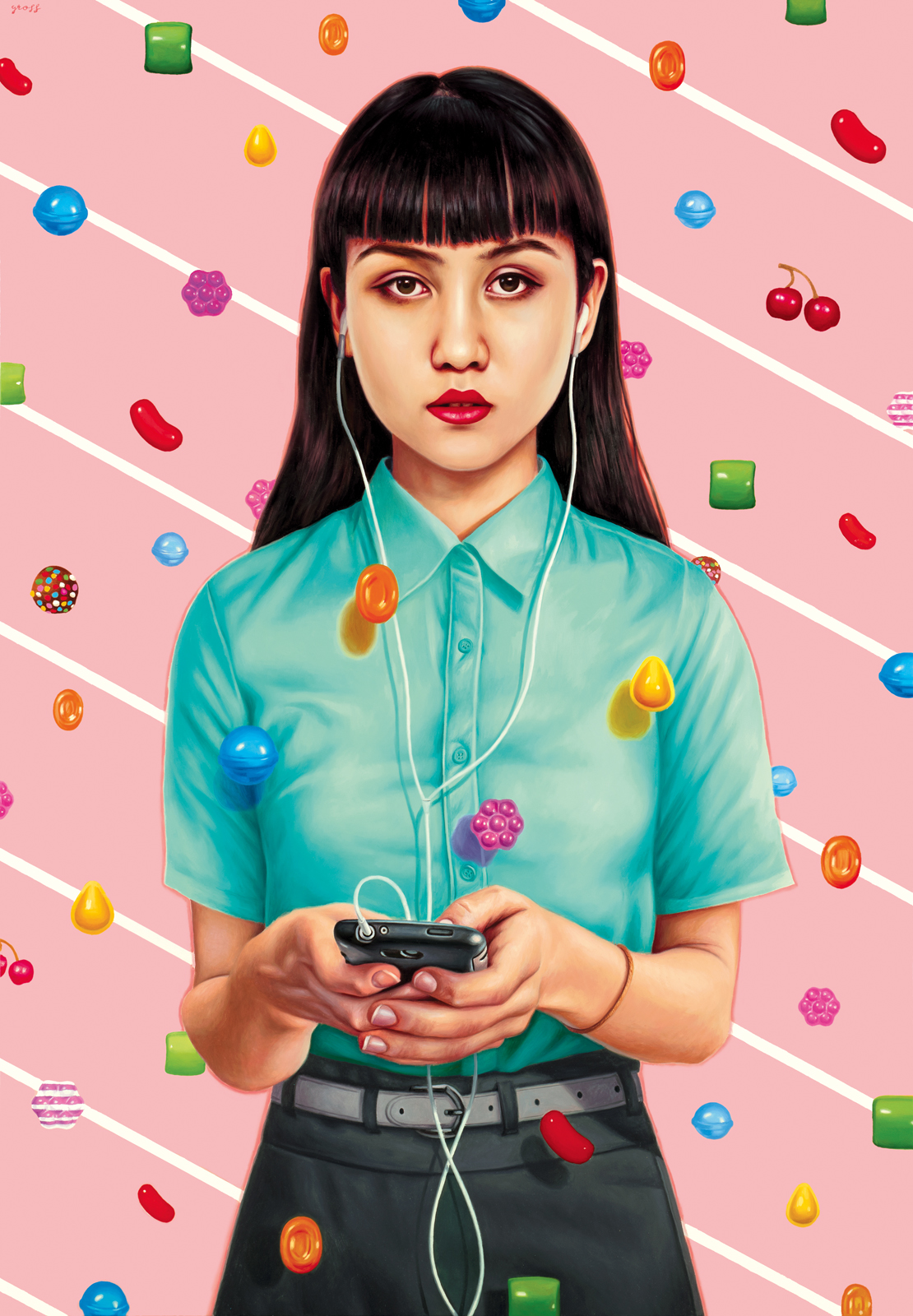ALEX GROSS: THE FUTURE IS TENSE
THE FUTURE IS TENSE
If someone from the far future had to pick a painting that best depicts our time, it would be that of Alex Gross. be it a teenager playing Candy Crush on her iPhone, a couple of Chinese housewives drowning in LV or an iPad-clad nation taking a selfie, the American pop surrealist has crystallized a visual recollection of a vast world made smaller with a click of a button. Touching upon themes like consumerism, industrialization and self-consumption, his paintings can be dubbed ironic, alarming yet surreally real.
“Surrealism for me represents the art turn of the human collective from concrete ideas to more abstract ones. Surrealism shows glimpses of what can be possible for us as a species.”
I recently came across your fourth book Future Tense. I find it a tauntingly beautiful depiction of mankind in our present day and a projection of our future. What is Future Tense?
Future Tense is the name of both my latest book and my most recent exhibition at the Jonathan Levine gallery in New York City. The show just happened last fall, in October and November. The book represents work from the last four to five years, including many of the new ones in this show, although not everything.
Coming up with a title for both was a challenge. I settled on ‘future tense’ for a few reasons: I like the sound of it, for starters. The multiple meanings within the phrase work well with the themes of the recent work. Most of the work revolves around industry, technology, consumerism, all of which are more or less modern inventions. And all of this technology that has made our world so much smaller has, simultaneously, brought things like increased fear mongering in the media, neurotic internet addiction, etc. The future we imagined a generation or two ago, where we would have robot servants and flying cars, is not the one we got. We got a much more disturbing one, wherein most people need to be connected all of the time, and where no one can pay attention for very long. These are some of the reasons why I thought ‘future tense’ worked well with the themes I’ve been dealing with lately.
Industrialization, consumerism technology are recurring themes in your latest works. Is it a celebration, a devaluation of mankind or a wakeup call?
Perhaps all of the above. The idea that painting in 2015 could be a wakeup call to any significant number of people is laughable to me. Even at my most didactic, I have no pretense about people waking up to anything that I have to say. But I do like the idea that a few people may connect with themes that my work discusses, and find something in common with what they’ve been thinking. At the same time, I am an artist, and I’m trying to make work that’s both thoughtful and also visually compelling and open to interpretation. I am not making propaganda and even when I get somewhat political, I still try to leave space conceptually for varied views. I suppose, in certain work, my point of view cannot be hidden too well. Ultimately people can interpret my work however they like.
Who are the protagonists in your paintings?
They tend to be younger, attractive folks. More ladies than men, but a mix of the sexes, and hopefully a gamut of various ethnicities. I want my work to reflect a wide range of young people. I don't paint many older people. I think I probably should. But many of the themes in my work deal with the younger generation and how they interact with their environment, and with others. It’s really about the change in the world since I was a young man to now, when I am truly middle-aged.
Your art is in one way or another dependant on the changes in our world and the popular culture. How did the world change since you first started painting? And how did you find your work evolve with it?
My work is more relevant to and reflective of the world around me than it was when I began working on personal paintings. With a background as an illustrator, I was initially interested in ‘image’ more than concept. As I continued to develop my fine art, the concept became more and more important.
Initially, I was very interested in Victorian imagery and my work reflected that interest. As time went by, I became more and more interested in making work about contemporary themes and the world in which I am living. This is why much of my recent work references technology like cell phones, ipads, ear buds, billboards, and other elements of modern culture.
When I started making fine art, cell phones were not a thing yet. The internet was pretty young, and people who went out to dinner with each other actually looked at and spoke to each other the entire night! Amazing now to think such a time ever existed. Watching cell phone technology take over the planet in just a few years, I couldn't help but incorporate cell phone imagery into my work. As technology continues to change and affect the way people live, I expect to deal with it in some manner within my work.
Narcissism is probably one of your most “shared” paintings in social media, and I really find it ironic. Does it worry you to see what is going on with the “Selfie-generation” or do you think there will soon be a backlash?
I never thought for one second that there would be a backlash against selfies. It’s an interesting thought, although not one that seems very likely to me. Honestly, I am more concerned with everyone’s inability to be in the present moment than I am with everyone taking selfies all of the time. I see far too many people driving cars while looking at phones too. I think the self absorption that people have today finds a perfect outlet in the smart phone and all the things one can do with it. Others really disappear when you fall into the rabbit hole of your device. Unfortunately, since we live in a society with other people, this can cause some real problems. that's a bigger concern to me than the self absorption that seems to be the norm with some younger people nowadays.
How do you escape this time of excess and access as a painter? (How do you find this thin line between reality and surrealism?)
It helps that I am pretty old now. If I were 28 or even 32, it might be different. But I’m in my forties now, married, with a kid, so I have a simple life. I can be pretty hermetic too, which can help me not get distracted with lots of things going on, because I am not participating in that much. I’m really in my own bubble. I only leave it when I want to, or when I need to buy something at the market.
If you had the choice to live in a certain period or decade of time, which one would it be?
Such a difficult question really. The 1960s and 1970s are both such glamourized decades in pop culture today. Film especially loves to portray the seventies as one long, wild party, with lots of good drugs and good times. The sixties was also very idealized when I was a kid in the 70s and 80s, but as time has passed it doesn’t sound like as much fun. I was alive and able to remember things in the 70s, but I was still just a kid. It has always seemed exciting to me to have been a young adult then, to go see Zeppelin and Floyd concerts, to snort cocaine at Studio 54, to have lots of sex without the fear of AIDS, to wear polyester suits. Most of my favorite pop culture comes from that decade, so perhaps it would be my choice, imperfect as it was.
But let’s face it, who can imagine life without the internet anymore? Its very difficult to picture. If I could have been Anjin-san in the novel Shogun, in Japan in the early Victorian era, then I probably would. In some ways, largely because of the internet, now is a pretty great time. But there's so much goddamn bullshit in the world today, every single corporation is screwing us on a level never done before, our own government now spies on us illegally, and the planet is going to shit. So, I don't know, maybe the seventies.
I know that a trip to Japan had a lot of influence on your early works. What was mesmerizing about it?
It's been so long that its hard to even remember. But Japan has for many years been expert at taking various cultural elements and blending them into a uniquely Japanese hybrid, Like pizza with potatoes and mayonnaise. You can find weird amalgams like this all over Tokyo. That's pretty liberating for a young artist interested in trying many different things in his artwork.
Have you been to any other places that inspired you recently? Where else would you like to explore?
I haven’t had enough opportunity to travel the last few years, and now I’ve just had a baby with my wife, so I’m afraid we won’t get much chance for a while longer. I’ve never done a proper, long Europe trip, just one time as a 17 year old, so that's something I would love to do when I have the time and the money. Argentina has always interested me as well. Buenos Aires seems sort of like the Europe of South America. But its kind of fucked up now too. I’ve never been to Hong Kong which is also on my list.
I want to talk about Los Angeles, your hometown and my favorite city. How does it feel to grow up in a city that is probably the farthest from the rest of the world? What impact did it have on shaping your personality and artworks?
I did not grow up in Los Angeles. I grew up in New York, and came to Los Angeles when I was 19 years old to attend art college. I’ve lived here ever since, but coming from the East Coast, I have always had an appreciation for the nature here that I think some people who’ve always lived here might not.
As far as LA being the farthest from the rest of the world, you might be talking about the distance from Europe, but as far as pop culture goes, we are the center of the world, since most of it is made here. And LA is much closer to Asia than New York is, so, we’ve got a lot of Asian connections here, large, authentic Asian communities, far more than New York has. That's one thing that I love here. Forget about getting great Japanese food in New York city, unless you’re quite rich. In LA, it’s almost limitless how many fantastic Japanese restaurants there are that don’t break the bank. Ramen places, sushi places, tonkatsu, soba, you name it, it’s here, it’s almost as good as Japan, and it’s not very expensive.
As a kid, I always wanted to come to California because of the Led Zeppelin song “Going to California.” Then my family visited when I was around 13 years old. It was so beautiful, the whole state. Palm trees, birds of paradise, mountains, all of this amazing nature that we did not have on flat, strip mall infested Long Island. And people seemed markedly happier here. Now I realize about half of that is just façade, but half is real. Calfornians are happier people than New Yorkers, I will just make that bold statement and piss off any new yorkers reading this. Sorry. Maybe its just Long Islanders, not New Yorkers. Growing up in the suburbs is very different than growing up in the city.
What can I say, I love California. I love LA, and I love San Francisco too. It’s far more expensive than LA unfortunately. Yes, New York has better museums, no question. But I don't care. LA has a far better quality of life. Its wonderful to visit NY for a week or so, here and there. But the noise, the dirt, the assholes, after a week, I can't wait to get out of there.
Tell us about your latest and future projects and exhibitions.
My latest work has been Ronan, my son, now 11 weeks old. It’s my first time being a dad, and it’s been quite an amazing experience. Only recently have I begun to start working on large paintings again. It really takes awhile to adjust to the new routines, and they keep evolving too. But I am finally working again.
I hope to exhibit in Los Angeles soon. I’ve been showing in NYC for around eight years now, and I love showing there at Levine gallery, where i will continue to show in the future. But LA is my home, and having a gallery here to work with would also be a good thing for my career. So, I have been talking to some people. First, I have to get back in the swing of things, and make some paintings. Then, perhaps, we will be able to set up something in the near future.
